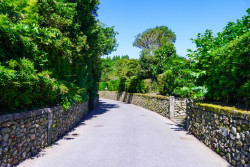
May 8, 2014
May 8, 2014
Bodies in the woods, stricter PhDs, fighters in the sky and more
By Metropolis
Originally published on metropolis.co.jp on May 2014

INTO THE WILD
- A man foraging for wild vegetables in a wooded area of Niigata made a gruesome discovery: the skeleton of a local woman who had been missing since November.
- Another Niigata vegetable forager was attacked by a 92kg “white-chested bear,” which was later shot and killed by hunters.
- For the second straight year, birdwatchers are conducting a survey of swallow nests at 42 train stations on the Chuo line Tokyo and Takao.
- Researchers at Kyoto University say they’ve developed a better way to extract shale gas—namely, by injecting C02 into the bedrock instead of water.
YOU’VE GOT TO BE SH***ING ME
- Members of a Kanagawa-based civic group have “nominated” the war-renouncing Article 9 of the Japanese Constitution for a Nobel Peace Prize.
- It was reported that an increasing number of young Japanese women are visiting kofun (ancient burial mounds) because they think the shapes are “kawaii.”
- Staff at the National Institute of Population and Social Security Research say 37.2 percent of all Japanese households will be made up of single adults by the year 2035.
- In the wake of the controversy surrounding stem-cell research at the Riken institute, administrators at Waseda University’s graduate school of engineering are conducting a review of all the 280 PhD theses that they’ve ever awarded.
C’MON IN
- One year after waiving visa requirements for travelers from Thailand and Malaysia, Japanese immigration authorities are planning to do the same for Indonesians, Filipinos and Vietnamese.
- The cabinet held its first meeting to discuss the 2020 Tokyo Olympics, and members vowed to “increase barrier-free public facilities and prepare to receive visitors from abroad.”
- Meanwhile, nearly two-thirds of respondents to a TMG survey said the best way for Japanese people to facilitate communication with foreigners is to inform them of the differences between the “traditions and habits of Japan [and those] in their home countries.”
- Google Japan is being blamed for a server error that allowed an environment ministry mailing list to be publicly viewable last year.
WE’RE NO. 1!
- Japanese dancers won both the junior and senior titles in the boys division of the Youth America Grand Prix, which is open to pint-sized hoofers of all nationalities.
- Nahoko Uehashi became the first Japanese author since 1994 to win the Hans Christian Andersen Award, which is presented annually to writers and illustrators who have “made a lasting contribution to children’s literature.”
- Researchers at the Geospatial Information Authority say Mt Hiyori in Sendai is the country’s shortest mountain. The peak rises just 3m above sea level.
- Break out the booze and the perfume: officials at Narita Airport are allowing passengers to once again take liquids on their international flights.
GOOD NEWS, BAD NEWS
- The communications ministry says the ratio of female researchers in Japan—14.4 percent—is the highest it’s ever been.
- And yet that figure ranks Japan lowest among “major countries.”
- Authorities at the defense ministry scrambled fighter jets a record 415 times in fiscal 2013 in response to aircraft from China approaching Japanese airspace.
- In a related item, the defense ministry has deployed a squadron of E-2C early warning aircraft at an Air Self-Defense Force base in Okinawa.
Compiled from reports by AP, Japan Today, The Japan Times, Jiji, The Tokyo Reporter, The Mainichi, The Japan News, AFP, Reuters and Kyodo







